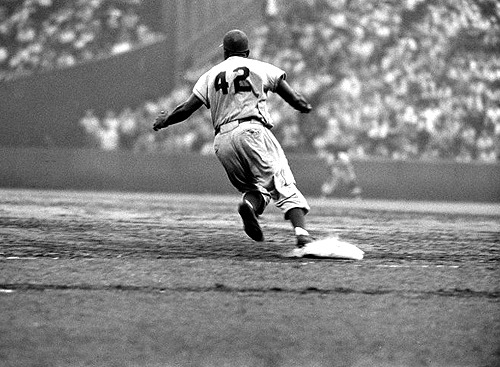

April 15, 1947: Jackie Robinson breaks the “baseball color line”.
Professional American baseball was established in 1869, four years after the end of the Civil War; while African-Americans did have their own clubs and professional leagues, Major League Baseball was de facto segregated from its founding until 1946 (non-whites had previously played in the MLB, however), when Jackie Robinson, a Georgian and a Negro League baseball player, signed with the Brooklyn Dodgers.
Robinson played his first game with the Dodgers on April 15, 1947, at Ebbets Field in front of a crowd of 26,000, over half of whom were black. Robinson received torrents of racist hatred and resentment from spectators, from opposing teams, and from even his own teammates. When Robinson, who had once been court-martialed during his time as an army officer for refusing to move to the back of a bus asked Branch Rickey, “are you looking for a Negro who is afraid to fight back?” Rickey famously responded that he was looking for a player “with guts enough not to fight back”. Robinson’s first step toward the integration of Major League Baseball was neither smooth nor simple - Robinson was heckled with slurs and even injured while playing, he and his family were met with death threats and violence, and some of his own teammates refused to play alongside a black player (though others, like Pee Wee Reese and Hank Greenberg defended Robinson). But his debut was a monumental moment in baseball history; in 1948, 1951, and 1956, baseball greats like Satchel Paige, Willie Mays, and Hank Aaron all signed with major league teams.
In 1962, Robinson was inducted into the Baseball Hall of Fame. His jersey number, 42, has since been retired by all Major League Baseball teams. Later in his life, he served on the board of directors of the NAACP, supported the SCLC and CORE, and worked to promote civil rights - writing that he wouldn’t “‘have it made’ until the most underprivileged Negro in Mississippi can live in equal dignity with anyone else in America.”